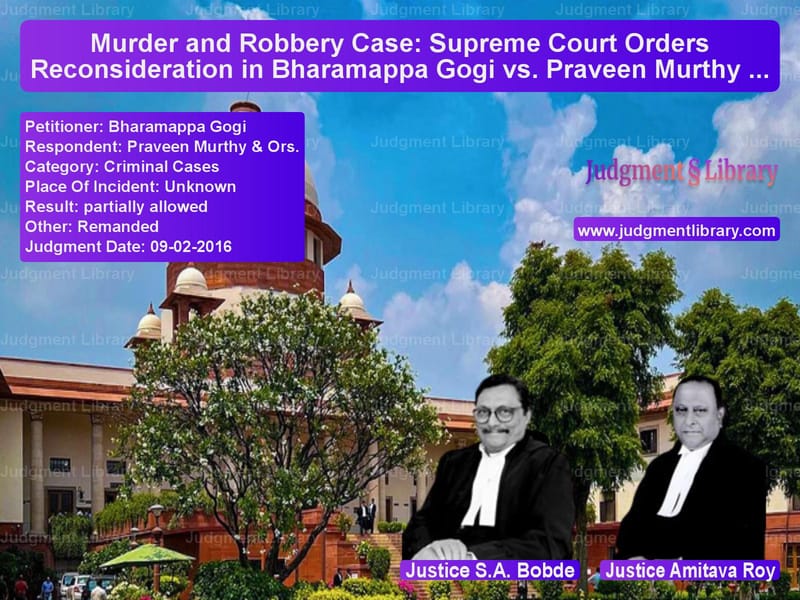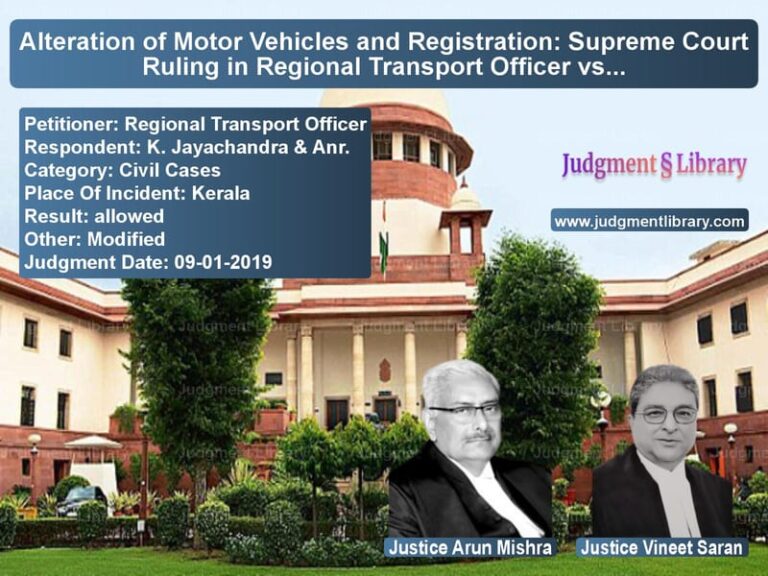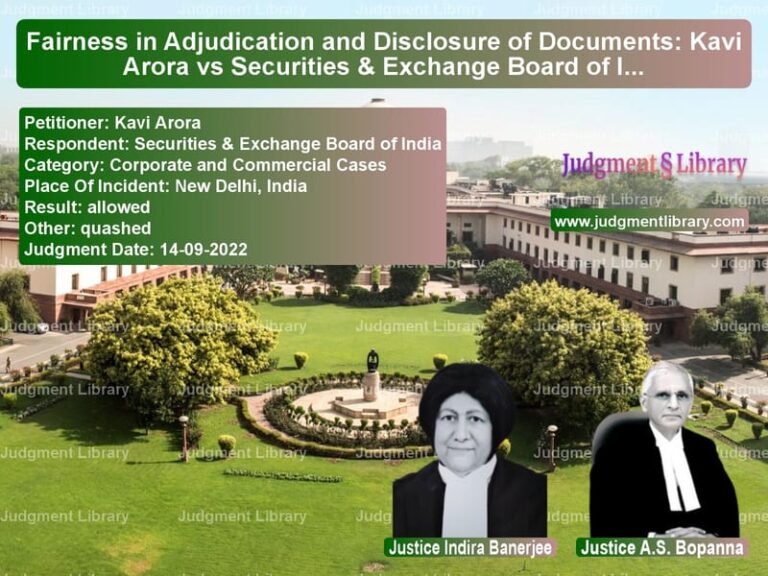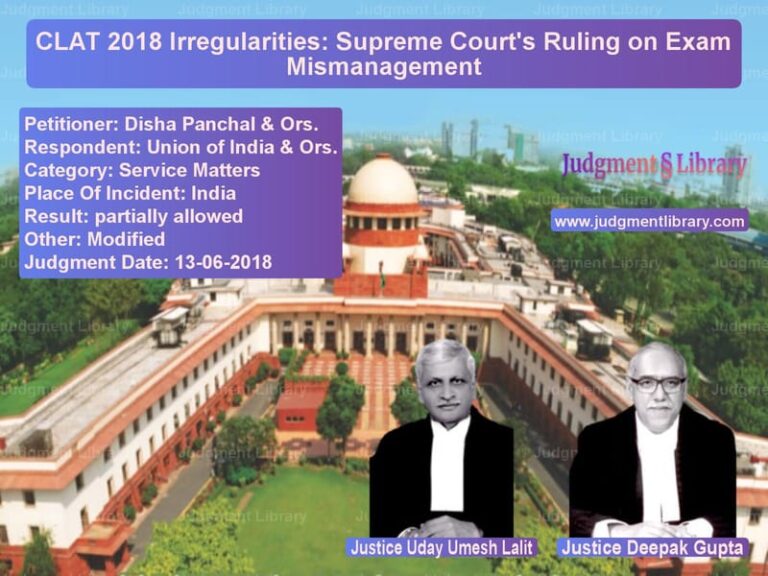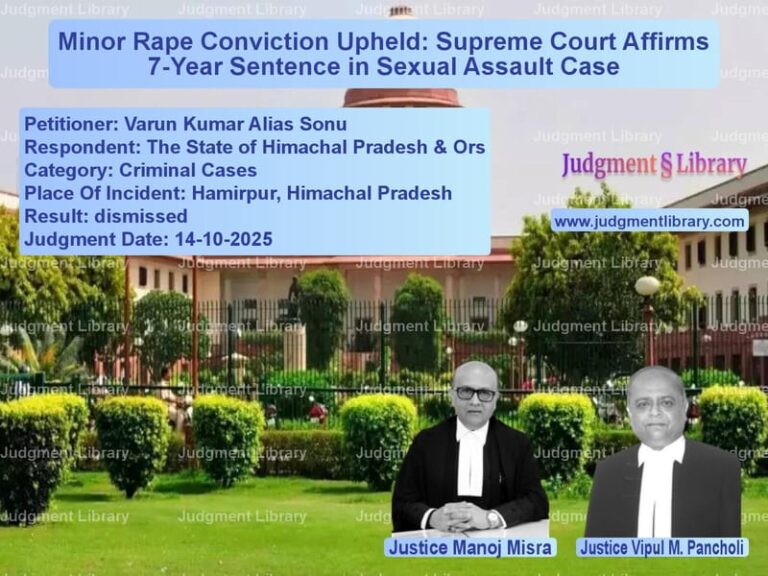Murder and Robbery Case: Supreme Court Orders Reconsideration in Bharamappa Gogi vs. Praveen Murthy & Ors.
The case of Bharamappa Gogi vs. Praveen Murthy & Ors. revolves around a criminal dispute involving charges of murder, robbery, and house trespass. The case initially resulted in convictions by the trial court, followed by modifications and remand orders by the High Court. Eventually, the matter was taken up by the Supreme Court, which decided to restore the appeals before the High Court for fresh consideration.
Background of the Case
The prosecution’s case dates back to the night of April 18, 2005, when the deceased, Nemiraj Gogi, was at home while his family was out of station. During that night, the accused allegedly broke into the house, robbed valuables, and murdered the victim.
According to the prosecution, the next morning, the housemaid discovered the deceased and informed his brother, who then lodged an FIR on April 19, 2005, at 8:00 AM, stating that unknown individuals had committed the crime. During the investigation, valuables were recovered, allegedly at the instance of the accused. The police also seized a knife, which was believed to be the weapon of the crime, along with blood-stained clothes.
Trial Court Proceedings
Based on circumstantial evidence, the trial court framed charges against the accused under the following sections:
- Section 120B IPC – Criminal conspiracy
- Section 302 IPC – Punishment for murder
- Section 390 IPC – Robbery
- Section 392 IPC – Punishment for robbery
- Section 457 IPC – House trespass and burglary
- Section 34 IPC – Common intention
The trial court convicted the accused under the above sections, except that two of the accused were acquitted of the murder charge. One of the accused was, however, convicted under Section 302 IPC as well.
High Court Decision
The accused challenged their convictions before the High Court. While hearing the appeals, the High Court observed the following:
- The trial court did not frame a charge under Section 397 IPC (robbery with attempt to cause death or grievous hurt).
- The trial court’s analysis of the evidence was flawed.
- It was unjustified to acquit two of the accused under Section 302 IPC.
Invoking its suo motu revision powers under Sections 386 and 401 Cr.P.C., the High Court:
- Set aside the trial court’s conviction and ordered the framing of charges under Section 397 IPC.
- Remitted the case back to the trial court for fresh adjudication, allowing the trial court to record additional evidence, if necessary.
Supreme Court’s Intervention
The Supreme Court, while reviewing the High Court’s decision, noted certain fundamental issues:
- The High Court should have focused on hearing the appeals on merit rather than remanding the matter back to the trial court.
- It was unnecessary to frame charges under Section 397 IPC when the trial court had already framed adequate charges covering the crime.
- Since the case was based on circumstantial evidence, the High Court should have reviewed the evidence rather than directing a fresh trial.
The Supreme Court ruled that the High Court had erred in remanding the case and held:
- The criminal appeals before the High Court should be restored and heard based on the existing charges.
- The High Court must decide the appeals on merits without requiring additional evidence.
- The remand order was set aside, and the case was sent back to the High Court for fresh adjudication.
Key Legal Provisions Considered
The Supreme Court examined various provisions under the Indian Penal Code (IPC), including:
- Section 120B – Criminal conspiracy
- Section 302 – Punishment for murder
- Section 390 – Definition of robbery
- Section 392 – Punishment for robbery
- Section 397 – Robbery with attempt to cause death or grievous hurt
- Section 457 – House trespass and burglary
- Section 34 – Common intention
Final Judgment
The Supreme Court concluded that the High Court should have heard the appeals rather than remanding the case. Accordingly, it ordered:
- The appeals before the High Court to be restored.
- The High Court to conduct fresh hearings based on existing evidence.
- The remand order to be set aside.
- No observations on the merits of the case were made.
Conclusion
The Supreme Court’s ruling emphasizes that appellate courts should focus on reviewing evidence and deciding appeals on merit instead of remanding cases unnecessarily. This judgment upholds procedural fairness and ensures that justice is delivered without undue delay.
Don’t miss out on the full details! Download the complete judgment in PDF format below and gain valuable insights instantly!
Download Judgment: Bharamappa Gogi vs Praveen Murthy & Ors Supreme Court of India Judgment Dated 09-02-2016-1741852580651.pdf
Direct Downlaod Judgment: Direct downlaod this Judgment
See all petitions in Murder Cases
See all petitions in Theft and Robbery Cases
See all petitions in Attempt to Murder Cases
See all petitions in Judgment by S. A. Bobde
See all petitions in Judgment by Amitava Roy
See all petitions in partially allowed
See all petitions in Remanded
See all petitions in supreme court of India judgments February 2016
See all petitions in 2016 judgments
See all posts in Criminal Cases Category
See all allowed petitions in Criminal Cases Category
See all Dismissed petitions in Criminal Cases Category
See all partially allowed petitions in Criminal Cases Category

